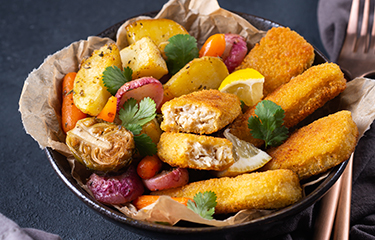Increasing sales of plant-based proteins and rising investor attention to cell-cultured seafood – a market which according to market research company Euromonitor is expected to be worth USD 23.2 billion (EUR 21.2 billion) by 2024 – is drawing more Latin American players into the market.
In the alternative seafood market, two countries seem to be taking the lead: Brazil and Chile. The former is undertaking research to accelerate alternative seafood innovation, and the latter has teamed with a unicorn firm – a privately held start-up that is valued at over USD 1 billion (EUR 914 million) – looking to leverage its success in plant-based beef and milk to expand into plant-based seafood analogs.
In Brazil, the trade group Good Food Institute (GFI) recently awarded funds to researchers at the Brazilian Agricultural Research Corporation (Embrapa), with Almirante Paulo Moreira Institute for Sea Studies as a partner, to identify the characteristics of what it calls the “gold standard” of seafood products. Embrapa will work with Fishtag, a conventional seafood supplier with a strong focus on sustainability and traceability, to ensure the seafood samples evaluated are of known origin and of high quality and freshness.
The project will collect quantitative data from shrimp and six fish species: Atlantic salmon, bigeye tuna, yellowfin tuna, swordfish, grouper, and snook, and work to define specific characteristics such as color, texture, and fat content.
The data generated from this project will be made available to the community via GFI’s PISCES tool, which provides information regarding the characteristics of conventionally produced seafood. The goal is to employ this information to speed up the development and commercialization of alternative seafood.
The new data generated through the project will expand the Good Food Institute's PISCES database, adding information regarding measurements of color and pH, muscle tissue, compounds that contribute to aroma, instrumental texture, and protein functionality – all aspects that will form the basis for the development of future plant-based and cell-cultured seafood products, according to Fabiola Fogaça, the leader of the Embrapa project. The end goal is to support independent research projects, making it easier for them to coordinate, avoid effort duplication, and build on each other’s work.
“My view is that the future of the food/protein industry will be cell-based. Hopefully, in 50 years, there will be no animals being killed for food,” Fishtag Head of Business Development Verônica Ribeiro said. “We are thrilled to be part of this project and hope that the fish we provide will help plant-based and cell-based developers create delicious seafood.”
Consumers eat between 200 and 300 different species of fish and shellfish, and so there are endless opportunities to develop novel alternative seafood products, according to GFI.
“Furthermore, with alternative seafood offering the promise of more-consistent product quality than what is often possible with conventional seafood, this choice of a target could make the difference between consistently high-quality and consistently average-quality products,” it noted.
In Chile, TheNotCompany (“NotCo”) has seen significant success in employing its artificial intelligence (AI) algorithm, dubbed Giuseppe, to produce plant-based milk (“NotMilk”), hamburger (“NotBurger”), mayonnaise (“NotMayo”), and ice cream (“NotIceCream”) for commercialization in the U.S., Canada, Brazil, Argentina, Chile, Mexico, Peru, and Colombia; in less than five years it has become the fastest-growing food tech company in Latin America. At the end of 2021, it launched “NotChicken,” and its founders have said they will now turn their attention to producing plant-based seafood analogs.
“Following chicken, we’re now looking at the water. It’s in the replacement of tuna and salmon where we want to move the needle," NotCo CEO Matías Muchnick told local paper La Tercera. "For example, in the case of salmon, there is an industry that has destroyed the south of Chile. We need something new to really start to replace something as ferocious as industrial fishing."
Mid-2021, investors in NotCo’s USD 235 million (EUR 215 million) D-round funding included New York City-based Tiger Global, tennis player Roger Federer, Formula-1 driver Lewis Hamilton, and musician Questlove, giving it a valuation of USD 1.5 billion (EUR 1.37 billion). Previously, it had raised USD 330 million (EUR 302 million), with investors including Jeff Bezos’ Bezos Expeditions, Twitter Co-Founder Biz Stone, and consumer venture capital fund The Craftory.
In February 2022, it signed a joint venture with The Kraft Heinz Company “to reimagine global food production and advance toward a more sustainable future,” the firms announced in a release. The JV will look to leverage NotCo’s patented technology and AI solutions with Kraft Heinz’s brand portfolio and scale, to develop plant-based versions of co-branded products “at a level of speed, taste, quality, and scale yet to be seen in the industry.”
The JV, operating as The Kraft Heinz Not Company LLC, is to be headquartered in Chicago, Illinois, U.S.A., with R&D facilities in San Francisco, California, U.S.A. It will focus on plant-based innovation across various product categories of Kraft Heinz, which saw net sales of some USD 26 billion (EUR 23.7 billion) in 2021 alone.
“The joint venture with TheNotCompany is a critical step in the transformation of our product portfolio and a tremendous addition to our brand design-to-value capabilities,” Kraft Heinz CEO Miguel Patricio said. “It helps deliver on our vision to offer more clean, green, and delicious products for consumers. We believe the technology that NotCo brings is revolutionizing the creation of delicious plant-based foods with simpler ingredients.”
NotCo said its ultimate mission is to replace animal-based foods entirely, and in turn reverse the harm that their production has caused on the planet. It expects to list on the Nasdaq Stock Exchange in 2023.
Photo courtesy of Antonina Vlasova/Shutterstock







